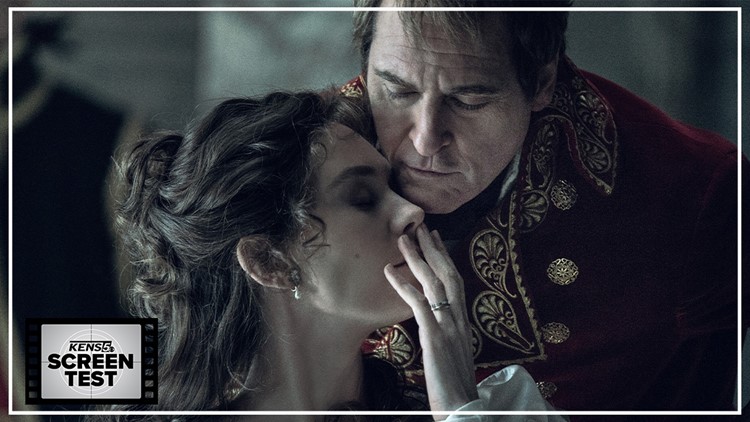SAN ANTONIO — One of the year’s most unexpected comedies mutates into a laborious historical epic in “Napoleon,” a 158-minute identity crisis of a movie that might’ve made the most of its contradictions if Ridley Scott had the conviction to embrace that the great, the big and the bloody can represent something more, something deeper—particularly given the director’s storied penchant for images great, big and bloody. Ever wondered what it’d look like if a horse received a direct hit from a cannonball?
It’s a sight, to be sure, though perhaps not as wild as watching Joaquin Phoenix’s military genius scrambling like a guilty puppy through a palace while still trying to keep up appearances for a country on the brink of post-French Revolution change. It isn’t that the Corsican commander doesn’t lend himself well to farce. It’s that, even for a storyteller who’s staked a pricklier claim to his deconstructions of hubris ever since directing one of the gnarliest scenes of the last decade in “Alien: Covenant,” the image of one of history’s most famous conquerors nearly tripping his way to a very different outcome for the entire Eastern Hemisphere makes you appreciate movies’ unique ability to explore how much of history is comprised of sheer chance.
The same might go for those movies themselves; we'll likely soon get a four-hour director’s cut representing Scott’s uninhibited take on the Napoleon mythos, but this theatrical version snips away just enough that it becomes hard to appreciate the film’s moments of acidic greatness amid its appetite for grit and gore.
The film (written by David Scarp) uses as its framing device Napoleon’s courtship of, marriage to, fallout from and lingering communications with Josephine de Beauharnais (Vanessa Kirby). It wouldn’t do to call what they have romance. It’s more like a staring contest: Can Josephine endure Napoleon’s petulant cravings longer than Napoleon can pretend he’s worth her affections despite being publicly mocked about her infidelity while he’s out at war? There’s an impish charm to their dynamic, and watching the (rather jarring) evolution of their relationship isn’t entirely unlike gazing through the chain-link fence of a schoolyard where tempers can flare at any time.
Of course, here tempers flare with the might of armies and canons. There’s something viciously funny and morbid about how the movie’s first major set piece – a chaotic ambush on British forces, and potentially one of the last Hollywood sequences of its kind that we’ll ever see – is the result of Napoleon gunning for a promotion more than Napoleon fighting for his country. Chaos snaps to calm and right back again often in the film, never more memorably than when the image of a screaming and bloodied woman cuts directly to the Napoleon and Josephine's wedding, those screams still bouncing around in our heads; in that moment, bleak comedy is further soured by the realization that Napoleon will continue needing validation no matter how many millions die during his pursuits.
The movie is at its richest when Scott and Scarpa fashion their eponymous conqueror into a cumbersome toddler who looks like he managed to wriggle his way into an adult-sized military commander costume and decided to put on a show. It isn’t exaggeration; watch as Phoenix whimpers, groans and purrs his way into Josephine’s tolerating graces. The juxtaposition between seeing him crawl his way to her under the dinner table and watching as he observes a battlefield massacre is something to behold – and guffaw at – even as the specifics of history are so haphazardly drawn that onscreen text of dates and events become less a guide and more a distraction.
But the appealing wryness Scott lends to the Napoleon story has limits, it seems. And what should it be that restrains the movie’s power but the very caliber of visceral moviemaking the “Gladiator” director is best known for? It’s ironic and frustrating that as we marvel at the epic battle sequences that dominate the movie’s back half, we wonder how the early momentum of the screenplay’s ideas spun so out of focus. This is a span of Napoleon’s life that sees him separate from Josephine yet still inextricably linked, a stretch that sees Kirby playing the role of specter, too absent for the movie's own good. Meanwhile, Napoleon marches ahead in his ambitions, sipping drinks with Austrian emperors and trotting through crumbling megacities.
What Scott forgets to do as he and his collaborators orchestrate hellish images of military tenacity is leverage that principle aesthetic (one inspired by few other filmmakers as much as the Scott, no less) against the cruelty of Napoleon himself. As the movie devotes increasingly less time to interpreting Napoleon and more scenes showing him glaring over carefully manicured spectacle, it’s tempting to think Scott is admiring the bloody triumphs he collected despite the brat Phoenix makes Napoleon out to be rather than attempting to say something clear about tyrants and their ceaseless cravings. Whatever the case, this apparently pared-down version of Scott’s ultimate project isn’t consistent with its depictions—if there’s any psychological abyss separating Napoleon the needy man-child from Napoleon the brilliant strategist, the movie is content to merely gaze across and not into it.
"Napoleon" is rated R for strong violence, some grisly images, sexual content and brief language. It's in theaters now. Runtime: 2 hours, 38 minutes.
Starring Joaquin Phoenix, Vanessa Kirby, Tahar Rahim, Rupert Everett
Directed by Ridley Scott, written by David Scarpa
2023
>MORE REVIEWS:



